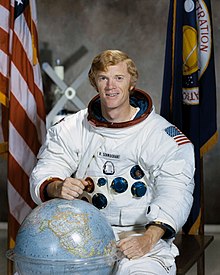Rusty Schweickart
| Russell L. Schweickart | |
|---|---|
 |
|
| NASA Astronaut | |
| Nationality | American |
| Status | Retired |
| Born |
October 25, 1935 Neptune Township, New Jersey, U.S. |
|
Other names
|
Russell Louis Schweickart |
|
Other occupation
|
Research scientist, fighter pilot, business executive, government executive |
| Massachusetts Institute of Technology, B.S. 1956, M.S. 1963 | |
|
Time in space
|
10d 01h 00m |
| Selection | 1963 NASA Group 3 |
|
Total EVAs
|
1 |
|
Total EVA time
|
1 hour 7 minutes |
| Missions | Apollo 9 |
|
Mission insignia
|
|
| Retirement | 1977 |
| Awards | |
Russell Louis "Rusty" Schweickart (also Schweikart; born October 25, 1935) is an American aeronautical engineer, and a former NASA astronaut, research scientist, U.S. Air Force fighter pilot, as well as a former business executive and government executive.
Selected in 1963 for NASA's third astronaut group, he is best known as the Lunar Module Pilot on the 1969 Apollo 9 mission, the first manned flight test of the Lunar Module, on which he performed the first in-space test of the Portable Life Support System used by the Apollo astronauts who walked on the Moon. As backup Commander of the first manned Skylab mission in 1973, he was responsible for developing the hardware and procedures used by the first crew to perform critical in-flight repairs of the Skylab station. After Skylab, he served for a time as Director of User Affairs in NASA's Office of Applications.
Schweickart left NASA in 1977 to serve for two years as California Governor Jerry Brown's assistant for science and technology, then was appointed by Brown to California's Energy Commission for five and a half years, serving as chairman for three.
In 1984–85 he co-founded the Association of Space Explorers and later in 2002 co-founded the B612 Foundation, a non-profit organization dedicated to defending Earth from asteroid impacts, along with fellow former astronaut Dr. Ed Lu and two planetary scientists. He served for a period as its chair before becoming its chair emeritus.
...
Wikipedia
